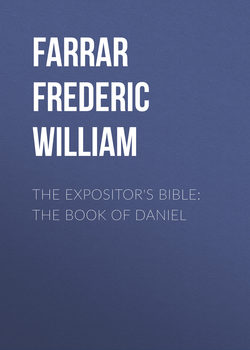Читать книгу The Expositor's Bible: The Book of Daniel - Farrar Frederic William - Страница 13
PART I
CHAPTER V
THE THEOLOGY OF THE BOOK OF DANIEL
ОглавлениеAs regards the religious views of the Book of Daniel some of them at any rate are in full accordance with the belief in the late origin of the Book to which we are led by so many indications.143
I. Thus in Dan. xii. 2 (for we may here so far anticipate the examination of the second section of the Book) we meet, for the first time in Scripture, with a distinct recognition of the resurrection of the individual dead.144 This, as all know, is a doctrine of which we only find the faintest indication in the earlier books of the Canon. Although the doctrine is still but dimly formulated, it is clearer in this respect than Isa. xxv. 8, xxvi. 19.
II. Still more remarkable is the special prominence of angels. It is not God who goes forth to war (Judg. v. 13, 23), or takes personal part in the deliverance or punishment of nations (Isa. v. 26, vii. 18). Throned in isolated and unapproachable transcendence, He uses the agency of intermediate beings (Dan. iv. 14).145
In full accordance with late developments of Jewish opinion angels are mentioned by special names, and appear as Princes and Protectors of special lands.146 In no other book in the Old Testament have we any names given to angels, or any distinction between their dignities, or any trace of their being in mutual rivalry as Princes or Patrons of different nationalities. These remarkable features of angelology only occur in the later epoch, and in the apocalyptic literature to which this Book belongs. Thus they are found in the LXX. translations of Deut. xxxii. 8 and Isa. xxx. 4, and in such post-Maccabean books as those of Enoch and Esdras.147
III. Again, we have the fixed custom of three daily formal prayers, uttered towards the Kibleh of Jerusalem. This may, possibly, have begun during the Exile. It became a normal rule for later ages.148 The Book, however, like that of Jonah, is, as a whole, remarkably free from any extravagant estimate of Levitical minutiæ.
IV. Once more, for the first time in Jewish story, we find extreme importance attached to the Levitical distinction of clean and unclean meats, which also comes into prominence in the age of the Maccabees, as it afterwards constituted a most prominent element in the ideal of Talmudic religionism.149 Daniel and the Three Children are vegetarians, like the Pharisees after the destruction of the Second Temple, mentioned in Baba Bathra, f. 60, 2.
V. We have already noticed the avoidance of the sacred name "Jehovah" even in passages addressed to Jews (Dan. ii. 18), though we find "Jehovah" in 2 Chron. xxxvi. 7. Jehovah only occurs in reference to Jer. xxv. 8-11, and in the prayer of the ninth chapter, where we also find Adonai and Elohîm.
Periphrases for God, like "the Ancient of Days," become normal in Talmudic literature.
VI. Again, the doctrine of the Messiah, like these other doctrines, is, as Professor Driver says, "taught with greater distinctness and in a more developed form than elsewhere in the Old Testament, and with features approximating to, though not identical with, those met with in the earlier parts of the Book of Enoch (b. c. 100). In one or two instances these developments may have been partially moulded by foreign influences.150 They undoubtedly mark a later phase of revelation than that which is set before us in other books of the Old Testament. And the conclusion indicated by these special features in the Book is confirmed by the general atmosphere which we breathe throughout it. The atmosphere and tone are not those of any other writings belonging to the Jews of the Exile; it is rather that of the Maccabean Chasidîm." How far the Messianic Bar Enosh (vii. 13) is meant to be a person will be considered in the comment on that passage.
We shall see in later pages that the supreme value and importance of the Book of Daniel, rightly understood, consists in this – that "it is the first attempt at a Philosophy, or rather at a Theology of History."151 Its main object was to teach the crushed and afflicted to place unshaken confidence in God.
143
The description of God as "the Ancient of Days" with garments white as snow, and of His throne of flames on burning wheels, is found again in the Book of Enoch, written about b. c. 141 (Enoch xiv.).
144
See Dan. xii. 2. Comp. Jos., B. J., II. viii. 14; Enoch xxii. 13, lx. 1-5, etc.
145
Comp. Smend, Alttest. Relig. Gesch., p. 530. For references to angels in Old Testament see Job i. 6, xxxviii. 7; Jer. xxiii. 18; Psalm lxxxix. 7; Josh. v. 13-15; Zech. i. 12, iii. 1. See further Behrmann, Dan., p. xxiii.
146
Dan. iv. 14, ix. 21, x. 13, 20.
147
See Enoch lxxi. 17, lxviii. 10, and the six archangels Uriel, Raphael, Reguel, Michael, Saragael, and Gabriel in Enoch xx. – xxxvi. See Rosh Hashanah, f. 56, 1; Bereshîth Rabba, c. 48; Hamburger, i. 305-312.
148
Berachôth, f. 31; Dan. vi. 11. Comp. Psalm lv. 18; 1 Kings viii. 38-48.
149
1 Macc. i. 62; Dan. i. 8; 2 Macc. v. 27, vi. 18-vii. 42.
150
Introd., p. 477. Comp. 2 Esdras xiii. 41-45, and passim; Enoch xl., xlv., xlvi., xlix., and passim; Hamburger, Real-Encycl., ii. 267 ff. With "the time of the end" and the numerical calculations comp. 2 Esdras vi. 6, 7.
151
Roszmann, Die Makkabäische Erhebung, p. 45. See Wellhausen, Die Pharis. u. d. Sadd., 77 ff.
